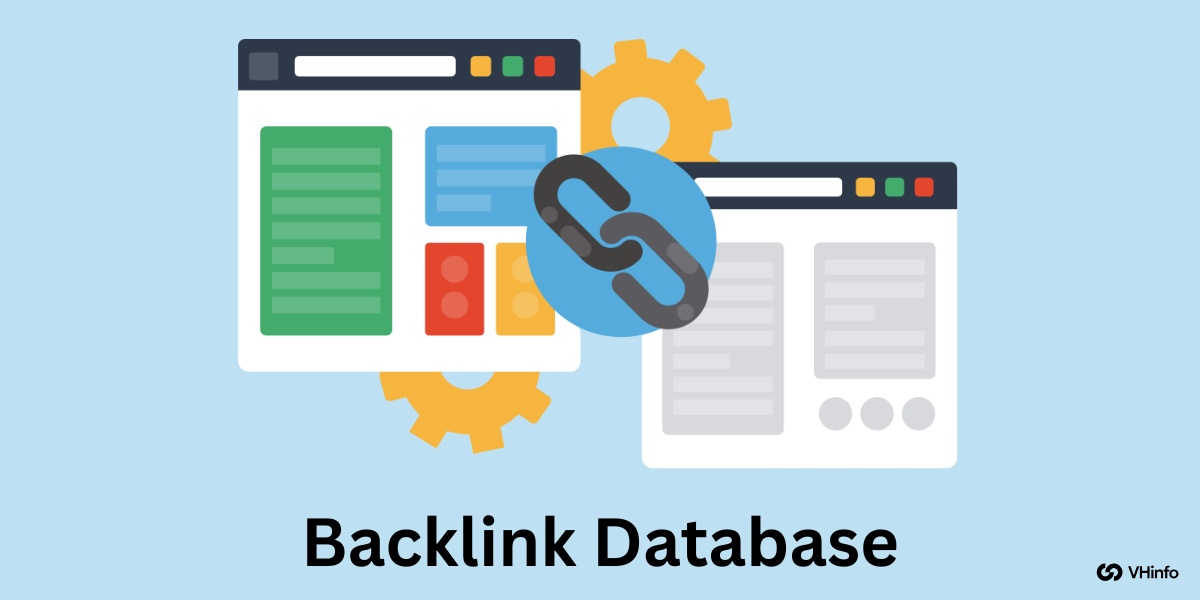Search Content Marketing is like creating valuable information online to attract people interested in what you offer. This helps get more visitors to your website.
In our guide, we’ll explore this method deeply and why it’s essential today.
We’ll talk about different types of content like blogs, videos, podcasts, and more. These can help you reach people at different stages when they’re figuring out what to buy. Plus, we’ll show real campaigns that worked well to give you ideas.
If you’re looking to boost your SaaS company’s online presence through effective link-building strategies, VH-Info, a specialized agency in this field, can assist you. They understand how to utilize content marketing to enhance your website’s visibility and attract your target audience effectively.
What Is Search Content Marketing?

Search content marketing refers to creating and optimizing online content specifically to appear in search engine results pages. The goal is to produce content that answers common customer questions so that it ranks highly in search engines when people look for information about a topic. By showing up prominently in searches and providing valuable information to searchers, brands build trust and credibility. This in turn leads site visitors to become loyal customers over time as they come to view the brand as an authority they can rely on to get in front of the right people at the right time and fulfill search intent. This includes optimizing all web pages and landing pages for search, containing clear messaging, and including all primary keywords.
Why is Search content marketing important?
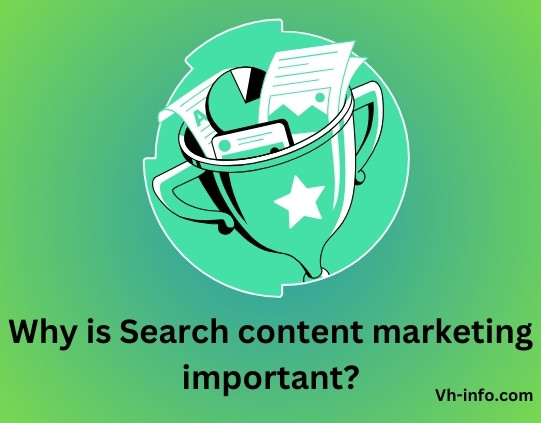
Here are the key reasons why search content marketing is important:
- It helps brands get discovered by people already actively searching for related information, products, or services – this means capturing an audience at the precise moment they are looking to engage.
- Optimized, useful content that answers search queries can drive qualified organic website traffic, reducing the need for expensive outbound marketing. Partnering with an affiliate recruitment agency can further amplify this effect by leveraging their networks to enhance visibility and reach.
- Ranking well in searches builds credibility and trust, positioning the brand as a reliable industry resource.
- Informative content answers questions and solves problems for searchers at no cost to them, fostering goodwill towards the brand.
- Strong search presence indicates relevancy and authority around keywords and topics, influencing searchers’ perceptions positively.
- Allows brands to reach customers during critical decision-making and research moments where they are more receptive to messaging.
- More cost effective than traditional interruptive advertising for gaining an interested audience.
Types of Search content marketing
Here are the main types of search content marketing:
- Blog articles – In-depth, long-form articles and blog posts designed to appear for informational search queries. They educate readers on topics and answer common questions.
- FAQ pages – Comprehensive lists of frequently asked questions and detailed answers on a topic. Helpful for customer research questions.
- How-to guides – Step-by-step tutorials for users looking for help completing tasks or learning processes.
- List posts/Roundups – Listicle-style posts that aggregate and compare products or tips around a topic. Useful for comparison shoppers.
- Video content – From snappy 60-second video FAQs to YouTube tutorials, video content can rank highly and inform searchers.
- Podcasts – Podcast episodes focused on searcher questions or industry topics can rank for terms prospects use.
- Case studies – Demonstrate expertise by showing how your product or service solved problems for real-life uses cases.
How does search content marketing works?
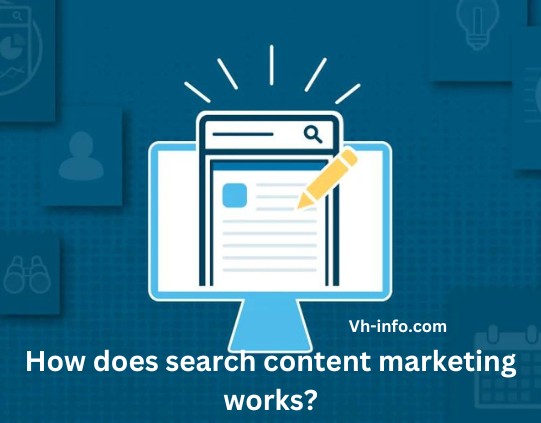
Once you know what kind of content your business will make, it’s time to plan how you’ll do it. Content marketing is about making connections and solving problems.
So, every strategy for content marketing should think about how to handle the three stages of content marketing.
1. Awareness
The awareness stage is the start of the customer journey. This is when people realize they have a problem. During this stage, content should talk about what customers need and what’s hard for them, without pushing too much about your solutions or products. The best types of content for this stage are blogs that answer common questions, helpful how-to videos, or detailed eBooks that give an overview.
2. Consideration
During the consideration stage, your audience is aware of their issue and starts searching for ways to fix it. At this point, businesses should keep providing useful information through content, but they can also include some promotions within the content. Good types of content for this stage are helpful infographics and how-to blogs.
3. Decision
In the decision stage, your audience makes up their mind about picking your solution or not. This is when your content should focus more on selling. Things like comparison lists, stories from happy customers, videos showing how the product works, and guides for buyers work best now. Businesses can also use paid ads that target people who showed interest before but didn’t continue, allowing you to choose a tone of voice that aligns with your brand and guide them through the buyer’s journey.
Search Content Marketing Examples
Here are some excellent content marketing examples from various companies:
- Netflix’s Blog: Netflix publishes an extremely popular blog sharing insights into user behavior, new releases, company culture, and more. It builds brand awareness and trust.
- Dollar Shave Club’s Video Content: Dollar Shave Club went viral with its funny video campaigns, driving massive growth. The videos entertained while educating people about its razors.
- REI’s #OptOutside Campaign: On Black Friday, REI closes its stores and pays employees to enjoy nature. This campaign aligns with REI’s brand and values on sustainability and the outdoors.
- Sedona Resort’s E-Book: Sedona Resort created an e-book positioning its resort as a luxury wedding destination. The informative e-book establishes Sedona’s expertise.
- Home Depot’s DIY Workshop Videos: Home Depot creates useful, engaging DIY video tutorials related to home improvement projects, attracting diy-ers to its brand and product offerings.
- Starbucks’ Blog and Social Content: From its “Idea in Action” blog to fun social content on seasonal drink flavors, Starbucks creates branded lifestyle content customers love sharing.
These are just a few stellar examples of how leading brands leverage the power of content to connect with customers in a genuine and strategic way. The content provides value while building affinity for brands.
What Is Content Marketing?

Content marketing is about sharing helpful and interesting stuff with your audience, like articles, videos, or social media posts. It’s not just about advertising your products; it’s about giving your audience information they find valuable. This content could be anything that solves their problems or gives them more knowledge about things they care about. By doing this, you become an expert in their eyes, and when they need something you offer, they’re more likely to choose you. It’s all about building trust and relationships by providing useful and effective content marketing campaigns that people actually want.
Content Marketing Examples

Here are some great content marketing examples from various companies and industries:
- Shopify: Shopify creates tons of valuable content focused on ecommerce, entrepreneurship, and running an online business. From blog posts and guides to webinars and podcasts, they consistently publish useful content that establishes them as thought leaders.
- HubSpot: Known for inbound marketing, HubSpot offers a wealth of blog posts, ebooks, courses, and more on topics like marketing, sales, customer service, and business growth. Their content is very educational and helpful for their target audience.
- Neil Patel: As an influential online marketer, Neil Patel frequently publishes in-depth, data-backed articles and guides on his blog. His content showcases his expertise and has helped him become a sought-after industry voice.
- Slack: With their brand focused on business collaboration, Slack publishes helpful blog posts and videos all about improving workflow, communication, and productivity in the remote work era. Their content fills a key need for their audience.
- Mailchimp: From guides to webinars and podcasts, Mailchimp creates useful content centered on email marketing, small business growth, and e-commerce. This positions them as a go-to resource for their customers.
- REI: With their outdoor enthusiast customer base, REI creates robust blogs and videos providing tips on outdoor sports, camping, hiking, biking, and more. This drives brand loyalty and sales.
The key is to consistently publish relevant, valuable content tailored to your audience like these leading brands do. Educational, inspiring, or entertaining content that fills a specific need or interest for your target customers.
Types of Content Marketing
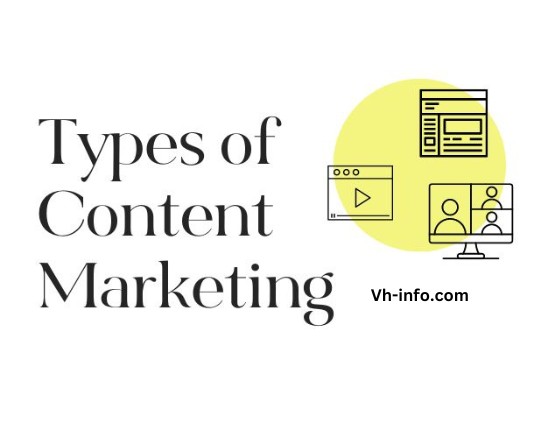
Lots of people who sell things use different ways to share information with others on different websites or apps. The kind of information they share depends on how they want to do business and who they want to talk to. It’s a good idea to include these types of sharing information in your plans for how you’ll sell things in 2024.
Blogs
Blogs are like stories that businesses write to talk about their products or share their knowledge. They use words, pictures, and sometimes videos. Blogs are really popular because they help businesses get noticed by people and search engines. They’re great for marketing because they’re affordable and easier to make than videos. To write a good blog, focus on one topic per article and use different lengths—short, medium, and long. But remember, longer doesn’t always mean better. Keep it interesting and helpful to keep people reading and provide a next step to move the visitor through the buyer journey and eventually convert them into a customer. Original research can also be a valuable addition to blog content, providing thought leadership and unique insights.
Video
Videos are super important for businesses to share things online, whether on their website or platforms like TikTok and YouTube. They help companies explain stuff quickly using pictures, music, and talking. Making videos has become easier and cheaper because of phones. Businesses use videos to show how things work, share thoughts from customers, talk about their team, or show new stuff they’re doing. Even though some might feel unsure about making videos, it’s a good idea for every company in 2023 because people really like watching them and want to see more from their favorite brands. Videos can also be changed into other things like blogs or social media posts, which helps companies make different content faster. Fortunately, AI video editors like Vidscale Pro simplify the video creation and editing process, making it easier for businesses to harness the power of video.
Podcasts
Podcast content marketing helps businesses talk to specific groups using audio content. They can make their own podcast collaborate with podcast promotion companies or be guests on others’ podcasts related to their business. In podcasts, businesses talk about solving problems for their audience, share customer stories, industry updates, and examples that connect with listeners’ feelings, and they can use free podcast transcription to make their content more accessible and engaging. Some businesses don’t realize the power of podcasts, but they’re becoming popular for connecting with customers, as more people are listening to podcasts nowadays.
Social Media
Social media marketing is when businesses share content like words, pictures, and videos on platforms like Instagram, Facebook, TikTok, and others. It’s a way for businesses to chat with customers in a more relaxed way than emails or websites. When people like the content, they might share it with others, helping the business reach more people. Plus, it brings more visitors to a business’s website regularly.
Infographics
Infographics are cool pictures showing interesting facts and numbers in a fun way, mainly used for business purposes. They simplify big ideas into easy-to-read visuals, often created from existing content like blogs. These pictures are great because they’re easy to understand quickly, and businesses can share them in smaller parts on social media. Tools like Adobe Express make creating these visuals quicker and simpler.
Ebooks
Ebooks are special books that businesses use to teach other businesses or shoppers about important things. They’re popular mostly for B2B businesses but sometimes used by B2C brands too. Companies make these books to get people’s emails and stay connected. To be effective, ebooks should offer valuable and unique information, like research or industry insights. Done well, they help businesses get more interest and look knowledgeable.
Paid Advertising
Paid advertising is when businesses use money to show their ads on search engines, social media, and other websites. These ads use words, pictures, or videos to catch people’s interest and make them want to learn more. It costs money each time someone sees or clicks on the ad. Even though it’s more expensive than other ways of marketing, it can bring quicker results and helps reach more people who might not have known about the business otherwise.
Why is Content Marketing Important?
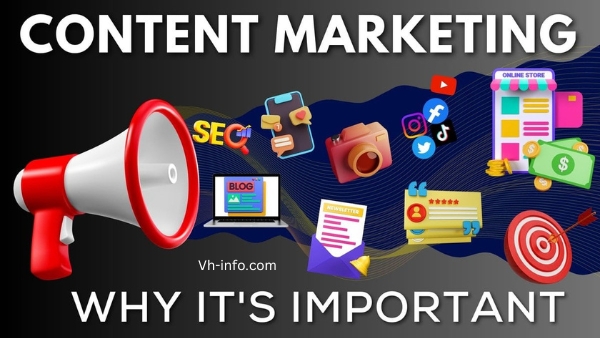
Imagine when you see lots of advertisements everywhere, like on TV or the internet. Sometimes there are so many ads that it’s hard to pay attention to all of them. Content marketing is like a different way for companies to talk about what they offer without just showing ads.
Here’s why it’s important:
- Helps people learn: Content marketing tells people about a company’s products or services in a helpful way. It’s like teaching them something interesting while also talking about what the company does.
- Makes more people interested: When a company shares useful information, more people notice and become interested in what they offer. This can help the company become more popular.
- Encourages people to buy: When a company shows it understands what people need, it makes them more likely to buy something from that company.
- Shows how it solves problems: Content marketing explains how a product or service can help solve a problem someone might have. This helps people understand how useful it can be.
- Helps a company become more known: By sharing good content regularly, more people get to know about the company. This makes the company more popular and easier to find online.
- Builds trust: When a company shares helpful and good-quality content, people start to trust it more. This makes them more likely to stay loyal to that brand.
- Content marketing is becoming more popular: Especially after the pandemic, more and more people are using content online. Companies are planning to create even better and more useful content to catch people’s attention.
So, content marketing is about making people interested in a company by sharing helpful and interesting information without just showing lots of ads. It helps companies to become popular, build trust, and show how their products or services can help people in different ways.
FAQ’s:
How Often Should I Update My Content For SEO Purposes?
Keeping your website content up-to-date is super important for how well it shows up on search engines like Google.
When you regularly update your site with new stuff that people are searching for, it helps your site appear higher in search results. This is because search engines really like to show the most recent and helpful content to people looking for information.
So, by adding new blog posts or making changes to your website, using words that people search for (keywords), you can improve where your site shows up in search results.
It’s not a strict rule, but updating every few weeks or months can make a big difference in how well your site does on search engines.
What Types Of Content Have The Most Success With SEO?
In the world of making your website stand out on the internet, using search engine optimization (SEO) is super important. It’s all about understanding what people search for and making your website’s content match that.
To do well, your content needs to have lots of keywords related to what people are looking for. Things like blog posts, videos, cool images, informative articles, and other helpful stuff can make your website more popular if you do them right.
Making sure your content is interesting to people and also looks good to search engines is key. That means having good titles, clear descriptions, and links inside your website that all help your website show up higher when people search for things.
So, the types of content that work best for SEO are the ones that people find helpful and that include the right words to match what they’re searching for.
What Is The Best Way To Track The Performance Of My SEO and Content Marketing Efforts?
Keeping an eye on how well your SEO and content marketing are doing takes some work, but it’s really important to know if your plans are working.
To do this, you can use special tools called analytics tools.
These tools help you see lots of details about how people are using your website, like how many visit your pages, how long they stay, and if they do what you want them to do, like buying something or signing up. This info helps you figure out what’s going well and what needs fixing.
Also, checking how each page is doing separately is a good idea. It helps you understand which pages are popular and which ones need a little help. This way, you can change things up to make them better or create new stuff that people will like more.
By using these tools and keeping an eye on your pages, you can make sure your hard work gets the best results possible.
How Can I Increase My Website Visibility With SEO and Content Marketing?
Want more people to notice your website? SEO and content marketing work together to make your site more visible. But how do they actually help your website get seen?
SEO, short for search engine optimization, is about making your web pages show up higher in search engines like Google. This involves using specific words (keywords), getting other websites to link to yours, and making sure your site loads fast.
On the other hand, content marketing focuses on making content that interests people and brings them to your website. This content can be articles, videos, cool pictures, or anything that’s helpful for readers.
When you use both SEO and content marketing, they’re like a super team for boosting your website’s visibility. By creating awesome content that’s also great for search engines, you make sure your website gets noticed by more people.
This means more folks finding your website through search engines or links from other sites. And when you improve your current content, it can climb higher in search results and bring in more potential customers for your business.
Mixing SEO with content marketing brings more visitors to your website and makes it easier for people to find what they need. So, with this cool strategy, you’ll reach more folks and give them the useful info they’re searching for!
Is There a Way To Automate SEO and Content Marketing Tasks?
there are ways to make SEO and content marketing tasks automatic. It’s totally possible! Using automation can make things easier by doing some of the repetitive work, so businesses can concentrate on more important stuff.
Loads of tools are out there that help automate SEO and content marketing jobs.
For instance, there are tools for finding new keywords without you having to search manually. Others can check your website for any technical issues that might stop people from finding it. Some tools even help share your content on social media automatically, bringing more visitors to your site.
These tools are awesome because they let businesses handle their SEO and content marketing tasks without spending heaps of time on them. With a smart plan, companies can save time and cash while still getting the results they want.
Conclusion
In conclusion, search content marketing plays a crucial role in reaching and engaging your target audience.
It allows you to create valuable and relevant content that aligns with their needs and interests, ultimately driving traffic, leads, and conversions.
By utilizing various forms of content such as blogs, videos, podcasts, social media posts, infographics, ebooks, and more, you can cater to different preferences and consumption habits.
Additionally, optimizing your content for local, voice, and visual search ensures that your brand is discoverable across different platforms and devices.
Incorporating search content marketing into your overall marketing strategy can help you establish your brand as an authoritative source and build strong relationships with your audience.



